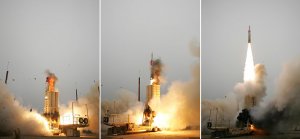 While no approach to ballistic missile defence is perfect, Ottawa should be aware of the potential benefits, costs, and risks of both kinetic and cyber approaches, write Andrew Futter and Jeffrey Collins.
While no approach to ballistic missile defence is perfect, Ottawa should be aware of the potential benefits, costs, and risks of both kinetic and cyber approaches, write Andrew Futter and Jeffrey Collins.
By Andrew Futter and Jeffrey Collins, August 20, 2018
The nuclear threat posed by North Korea has put ballistic missile defence (BMD) back on the radar of Canadian defence discussions. In a recent paper from the Macdonald-Laurier Institute, titled Should Canada Participate in Ballistic Missile Defence?, 90 per cent of defence experts polled favoured Canadian participation in BMD. Those surveyed include former diplomats and senior military officers, ex-political advisers to past defence ministers, and scholars.
The report found that today’s changed geopolitical circumstances warrants participation in missile defence. North Korea’s growing nuclear stockpile and advances in intercontinental ballistic missile technology now make it theoretically capable of striking North America. Iran’s nuclear and ballistic missile aspirations have not dissipated either and have arguably become more of a concern since President Trump pulled out of the Iran nuclear deal earlier this year. Former prime minister Paul Martin has even suggested that his government’s 2005 decision not to participate in BMD may be different today given these changed global circumstances.
True, Canada has effectively participated in U.S. missile defence plans for decades, by way of its role in the North American Aerospace Defence Command (NORAD), which feeds information that is used for missile interceptions. Canada’s membership in NATO also means it indirectly supports the Alliance’s own BMD activities.
But Ottawa has never committed itself directly to missile defence. Nearly two decades after President George W. Bush abrogated the 1972 Anti-Ballistic Missile Treaty and deployed a limited missile defence system to protect the United States, the time now seems ripe for full Canadian participation. While the nascent BMD systems are still experiencing technological challenges, they have become much more widely accepted in the U.S. Indeed, missile defence has become recognised as a part of national security planning across the globe by many countries, including Canadian allies in Europe and Asia.
However, any Canadian participation in BMD confronts the issue of financial cost. The only continental-based system capable of defending Canada from a North Korean launch is the ground-based BMD system. With 44 interceptors located in Alaska and California, it was estimated in 2017 that an additional 14 interceptors would cost US$1 billion. Outside of Canada offering a host ‘site’ for new interceptors, a straight-up purchase during a time of costly procurement projects seems politically out of the question.
One potentially attractive way to square the issue of cost is with cyber capabilities. The United States – at least partly due to a lack of confidence in the system deployed – is currently looking toward different options for defeating enemy missiles. This new approach includes “full spectrum” and “left of launch” operations, such as using cyber-attacks to prevent a launch or electronic measures to interfere with missile telemetry. Thus, a future rogue state nuclear threat to the United States might be defeated beforethe missile ever leaves the ground.
The revelation of the Stuxnet attack against the Iranian uranium enrichment facility at Natanz in 2010 gives some indication of what might be achieved through cyber means, and a series of North Korean missile test failures over recent years could have been the result of similar activities. Either way, such methods are clearly part of the plan to manage the North Korean challenge.
Such an approach may well be more effective, and indeed cheaper than the BMD interceptors. As proposed in Bill C-59, Canada already seems to have accepted the need to engage in offensive cyber operations, which opens up the possibility of a cyber missile defence option.
Policy makers would do well to assess the benefits of cooperating on “left of launch” cyber approach. But they also need to understand the potential costs as well. First, missile systems have to be breached “pre-emptively” and attacks may have to be carried out preventively; second, it is far harder to quantify this capability (as opposed to interceptors), which will cause big concerns for strategic competitors because cyber capabilities are far less tangible; third, the risk that such actions create a norm permitting attacks on sensitive military systems, is dangerous; and fourth, such activities may well backfire, especially if intruders are caught or attacks go wrong.
Taken together one wonders whether messing around in either nuclear command and control or delivery systems is really something that Canada wants to be doing.
Canadian policy makers therefore need to think long and hard about the type of missile defence mission they want to subscribe to and decide whether it makes sense to become involved with an expanded program to ensure greater protection, or whether it makes more sense to rely on – the far from guaranteed – kinetic interception. Neither approach is perfect, but officials in Ottawa must be aware of the potential costs and risks of both approaches, and of what they might be signing up to with partners south of the border.
Andrew Futter, PhD, is an Associate Professor of International Relations at the University of Leicester and author of the book, “Hacking the Bomb.” Jeffrey F. Collins, PhD, is a Fellow with the Canadian Global Affairs Institute and author of the MLI report, “Should Canada Participate in Ballistic Missile Defence?”




